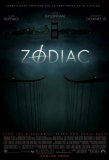| Reviews & Columns |
|
Reviews DVD TV on DVD Blu-ray 4K UHD International DVDs In Theaters Reviews by Studio Video Games Features Collector Series DVDs Easter Egg Database Interviews DVD Talk Radio Feature Articles Columns Anime Talk DVD Savant Horror DVDs The M.O.D. Squad Art House HD Talk Silent DVD
|
DVD Talk Forum |
|
|
| Resources |
|
DVD Price Search Customer Service #'s RCE Info Links |
|
Columns
|
|
|
Zodiac
Starting in 1968, a faceless killer known only as "The Zodiac" terrorized Northern California with a killing spree that took five lives, but through a manipulation of the press, ended up terrorizing the entire state. "Zodiac" tells the story of the killer through Inspector David Toschi (Mark Ruffalo) and San Francisco Chronicle cartoonist Robert Graysmith (Jake Gyllenhaal), who both led distinctive and comprehensive investigations into the Zodiac and his trail of hysteria and death.
Fincher's last picture, 2002's "Panic Room," was a rousing bit of digital suspense manipulation. The director pushed the limits of technology to bring audiences into the black heart of fear, and the whole endeavor crackled with cutting-edge tension and participatory vigor.
While not a self-conscious polar opposite, "Zodiac" nevertheless stays simple and visually grounded. Even the opening titles lack zest. Fincher's quest is to evoke the mood of the 60s and 70s, where newspaper journalism ruled and police procedures were still conducted through a cerebral cortex, not a hard drive. To accomplish this, Fincher shelves his usual bag of tricks and shoots the picture like a distanced classic Pakula film from the mid-1970s, down to the severe emphasis on character dimension over the sexual allure of thrill-based options. He even resurrects the old Paramount and Warner Brothers studio logos not flown in decades. Heck, this film wasn't even shot on film and it still feels 30 years old.
Giving himself a leisurely running time of 160 minutes, Fincher wants the audience to feel the strain and dread the Zodiac killer instilled in the populace during the nearly 40 years the case was open. For Toschi, every clue collected ran into a brick wall, putting his job at risk when decades flew by without an arrest. He lost partners and his reputation chasing down this enigma and that disillusionment is perfectly realized by Ruffalo – here playing the most adult character he's encountered to date with the most effort I've ever seen from him. Under Fincher's roof, Ruffalo can't get away with slack-jawed moping.
Graysmith's story hangs lower in the murky background. Starting as a curious onlooker at the Chronicle, Graysmith, and in turn Gyllenhaal's screentime, only comes into play for the film's final act, where the cartoonist's Zodiac inquisitiveness becomes too much to suppress, taking up the hunt long after the cops give up. The role plays well to Gyllenhaal's innate facial expression of wide-eyed curiosity, and Fincher keeps the actor on task when the poison of the Zodiac question mark starts to taint Graysmith's well at home (wife Melanie is played with Bailey Quarters-like reserve from Chloe Sevigny).
The true question of the film is, how can you satisfy an audience with a case that was never solved? Fincher and screenwriter James Vanderbilt (shockingly, the man behind the disasters "Darkness Falls" and "The Rundown") put in quite the effort to conjure up a villain, but "Zodiac" is much more efficient and focused just breathing in the evocative San Francisco crime scenes and the mystery eating away at these men. It's a very long 160 minutes, and I understand the need to send the audience out with some semblance of hope, but if you come to "Zodiac" looking for a resolution, I think you've missed the point.
A muted Fincher is still Fincher, and "Zodiac" gives the audience a matured filmmaker looking for new challenges in screen drama and different visual conquests. The trade off is an almost classically realized tale of desperation and fatigue that requires enormous amounts of patience and concentration to enjoy. The director is asking the audience to assume some of the effort here, and I hope it's one viewers are willing to take.
|
| Popular Reviews |
| Sponsored Links |
|
|
| Sponsored Links |
|
|
| Release List | Reviews | Shop | Newsletter | Forum | DVD Giveaways | Blu-Ray | Advertise |
|
Copyright 2024 DVDTalk.com All Rights Reserved. Legal Info, Privacy Policy, Terms of Use,
Manage Preferences,
Your Privacy Choices | |||||||











